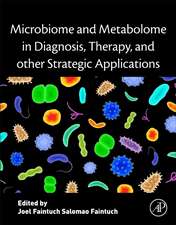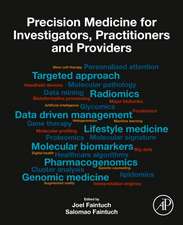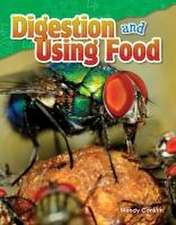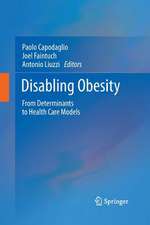Obesity and Diabetes: Scientific Advances and Best Practice
Editat de Joel Faintuch, Salomão Faintuchen Limba Engleză Paperback – 16 dec 2021
Obesity and type 2 diabetes are among the top global health-care budget concerns worldwide and impact professional practice at all levels: in hospitals, clinics and physicians’ offices alike. They prominently feature in headlines, and virtually no family, community or country is exempt from their protean, deleterious consequences. Furthermore, given the multiple intersections in their pathways, they often go hand in hand.
The good news is that scientific advances in all fields, including genomics, metabolomics, lipidomics and microbiomics, are increasing our understanding of these two disease areas. At the same time, artificial intelligence, machine learning, mobile health and advanced implantable and external devices are rendering prevention and management more available, safe and cost-effective. In addition, bariatric and metabolic surgery has evolved from a niche specialty to an officially endorsed option for several modalities of obesity and diabetes.
This book presents the latest lifestyle, pharmacological, surgical and non-surgical treatment options, including endoscopic intervention and cell therapy. Objectively reviewing natural and artificial sweeteners and critically examining issues such as public health initiatives, government mandated taxes for unhealthy foods and environmental planning, no stone is left unturned in gathering the latest practical information. As such, the book will appeal to seasoned specialists, as well as students and healthcare professionals in training.
| Toate formatele și edițiile | Preț | Express |
|---|---|---|
| Paperback (2) | 894.38 lei 6-8 săpt. | |
| Springer International Publishing – 16 dec 2021 | 894.38 lei 6-8 săpt. | |
| Springer International Publishing – 24 sep 2016 | 1024.75 lei 6-8 săpt. | |
| Hardback (1) | 1219.12 lei 6-8 săpt. | |
| Springer International Publishing – 15 dec 2020 | 1219.12 lei 6-8 săpt. |
Preț: 894.38 lei
Preț vechi: 941.45 lei
-5% Nou
Puncte Express: 1342
Preț estimativ în valută:
171.14€ • 179.16$ • 141.61£
171.14€ • 179.16$ • 141.61£
Carte tipărită la comandă
Livrare economică 05-19 aprilie
Preluare comenzi: 021 569.72.76
Specificații
ISBN-13: 9783030533724
ISBN-10: 3030533727
Ilustrații: XV, 994 p. 176 illus., 158 illus. in color.
Dimensiuni: 178 x 254 mm
Greutate: 1.72 kg
Ediția:2nd ed. 2020
Editura: Springer International Publishing
Colecția Springer
Locul publicării:Cham, Switzerland
ISBN-10: 3030533727
Ilustrații: XV, 994 p. 176 illus., 158 illus. in color.
Dimensiuni: 178 x 254 mm
Greutate: 1.72 kg
Ediția:2nd ed. 2020
Editura: Springer International Publishing
Colecția Springer
Locul publicării:Cham, Switzerland
Cuprins
Introduction to Obesity and Diabetes– The windows of opportunity.- Nutrition transition and obesity trends in Argentina within the Latin American context.- Challenges and Economic Burden of Diabetes in Africa.- Brown adipose tissue in obesity and diabetes.- White and Brown Adipose Tissue in Obesity and Diabetes.- microRNAs in obesity and metabolic diseases.- From Adipogenic Viruses to Anti-Diabetic Drug: A Translational Journey.- Genetic profiles in the obese population.- The Upstream Environment for the Obesity Epidemic.- Inflammation and its role in obesity-related complications.- Cross talk between adipose tissue, macrophages and other immune cells: Development of obesity and inflammation-induced metabolic diseases.- Diabetes forecasts and statistics for the coming decades.- Pancreatic islets of Langerhans: adapting cell and molecular biology to changes of metabolism.- Targeting advanced glycation end products (esRAGE and sRAGE) for obesity, diabetes and its associated complications.- Anti-incretin effect: a missing link between obesity, diabetes and metabolic surgery.- An update on Mendelian forms of obesity and their personalized treatments.- The Genetic Basis of Diabetic Kidney Disease.- Epigenetics and chronic inflammation: Role in early detection of type 2 diabetes.- Salivary and Urinary Metabolome in Pediatric Obesity and Metabolic Syndrome.- State-of-the-Art Metabolomics Investigations of Type 2 Diabetes.- The gut microbiome and type 2 diabetes mellitus.- Immunotherapeutic Approach to the Treatment and Prevention of Obesity.- Metabolic Syndrome Update.- Non-alcoholic fatty liver disease: a global public health issue.- Non-Alcoholic Fatty Pancreatic Disease (NAFPD).- Normal weight obesity – A hidden pandemic.- Obesity in Children/Adolescents and Obesity-Related Comorbidities.- Obesity and cancer: linked molecular mechanisms.- Cognitive impairment in obesity and diabetes.- Metabolic pathways underlying neuropsychiatric disorders and obesity.- Heart failure and the obesity paradox.- Inflammatory mechanisms in diabetic kidney disease.- The epidemiology of the diabetes - depression comorbidity in Brazil -inequality and interaction.- Contribution of Hyperglycemia and Unhealthy Diet to Cardiovascular Mortality.- Gestational Diabetes Mellitus.- Update on Gestational Diabetes.- Vascular complications in type 2 diabetes.- What We Know and Don’t about High-Intensity Sweeteners.- Personalised Molecular Feedback for Weight Loss.- Diabetes and Obesity in the Child and Adolescent: Guidelines and Challenges.- Type 2 diabetes – an unresolved disease.- Glucose control in the ICU.- Continuous glucose monitors as wearable lifestyle behavior change tools in obesity and diabetes.- Endoscopic techniques for obesity and diabetes.- Bariatric embolization: a possible non-surgical option for weight reduction.- Progress in noninvasive beta-cell mass imaging.- Cancer staging with 18F-FDG PET/CT in hyperglycemic patients.- Pancreatic Islet Transplantation: A Surgical Approach to Type 1 Diabetes Treatment.- Pancreatic Transplantation in Diabetes: Indications, Contraindications and Perspectives. -Pharmacotherapy of Type 2 Diabetes.- GLP1-Receptor Agonists in Diabetes: Drugs, General Effects, and Cardiovascular Impact.- Diabetes and treatments.- Treatment of Diabetes and Heart Failure.- Cardiovascular impact of newer diabetes medications.- Pathogenesis and Molecular Targets in treatment of Diabetic Wounds.- Efficiency in public health through the promotion of Diabetes Day Hospitals: a regional proposal.- Surgical options in obesity and diabetes.- One anastomosis gastric bypass in the treatment of obesity: effects on body weight and the metabolome.- Robotic bariatric surgery.- The Role of Obesity and Bariatric Surgery in the Management of Knee and Hip Osteoarthritis.- Relapse of diabetes after metabolic/bariatric surgery.- Malnutrition in Obesity.- Sugar-Sweetened Beverage Taxes: Origins, Mechanisms, and Current Worldwide Status.- Mobile Health Interventions for Weight Management in Overweight and Obese Populations.- Biomarkers and Machine Learning Applications in Obesity.- Current approaches in diabetes mellitus prediction: applications of machine learning and emerging biomarkers.- Polycystic ovary syndrome and sarcopenic obesity.- Drug Pipeline for Obesity Therapy.- MC4R as a Target for Pharmacotherapeutic Treatment of Obesity and Type-2 diabetes.- Nanotechnology: Can it be a crusader in diabesity?.- Old and new anti-obesity devices for medical, surgical, and endoscopical use.- Electroceutical approaches for gastroparesis.- Useful Online Resources Hosting Information on Obesity and Diabetes.
Notă biografică
Joel Faintuch is a gastrointestinal surgeon, and former international guest fellow of the American College of Surgeons. He is an honorary fellow of three foreign surgical societies, and has served as a Visiting Professor at the University of Maastricht. His interests include nutrition, metabolism, obesity, and bariatric surgery. He pioneered parenteral and enteral nutrition in Brazil and South America, and was a founding member of various medical societies. In recent years, his focus has been on the link between the microbiome and metabolome, and precision medicine. Joel Faintuch is the author of over 250 articles in peer-reviewed journals, along with 10 books, three theses, over 200 book chapters and other publications.
Salomao Faintuch is a radiologist, and Clinical Director of Vascular and Interventional Radiology at Beth Israel Deaconess Medical Center, Harvard Medical School. He has authored more than 50 articles in peer-reviewed journals, along with 7 society guidelines and standards of practice. He is a Radiological Society of North America Research Scholar, has participated in eight national society committees, and is member of the editorial boards of three international journals.
Salomao Faintuch is a radiologist, and Clinical Director of Vascular and Interventional Radiology at Beth Israel Deaconess Medical Center, Harvard Medical School. He has authored more than 50 articles in peer-reviewed journals, along with 7 society guidelines and standards of practice. He is a Radiological Society of North America Research Scholar, has participated in eight national society committees, and is member of the editorial boards of three international journals.
Textul de pe ultima copertă
Now in its second edition, this comprehensive handbook provides a state-of-the-art overview of recent advances in drug and non-drug therapies for obesity and diabetes. It also addresses major comorbidities, covering topics such as, cardiovascular diseases, renal and neuropsychiatric disorders, appetite control and micro RNAs. Special attention is also devoted to pediatric care, including the latest recommendations for therapy and prevention.
Obesity and type 2 diabetes are among the top global health-care budget concerns worldwide and impact professional practice at all levels: in hospitals, clinics and physicians’ offices alike. They prominently feature in headlines, and virtually no family, community or country is exempt from their protean, deleterious consequences. Furthermore, given the multiple intersections in their pathways, they often go hand in hand.
The good news is that scientific advances in all fields, including genomics, metabolomics, lipidomics and microbiomics, are increasing our understanding of these two disease areas. At the same time, artificial intelligence, machine learning, mobile health and advanced implantable and external devices are rendering prevention and management more available, safe and cost-effective. In addition, bariatric and metabolic surgery has evolved from a niche specialty to an officially endorsed option for several modalities of obesity and diabetes.
This book presents the latest lifestyle, pharmacological, surgical and non-surgical treatment options, including endoscopic intervention and cell therapy. Objectively reviewing natural and artificial sweeteners and critically examining issues such as public health initiatives, government mandated taxes for unhealthy foods and environmental planning, no stone is left unturned in gathering the latest practical information. As such, the book will appeal to seasoned specialists, as well as students and healthcare professionals in training.
Obesity and type 2 diabetes are among the top global health-care budget concerns worldwide and impact professional practice at all levels: in hospitals, clinics and physicians’ offices alike. They prominently feature in headlines, and virtually no family, community or country is exempt from their protean, deleterious consequences. Furthermore, given the multiple intersections in their pathways, they often go hand in hand.
The good news is that scientific advances in all fields, including genomics, metabolomics, lipidomics and microbiomics, are increasing our understanding of these two disease areas. At the same time, artificial intelligence, machine learning, mobile health and advanced implantable and external devices are rendering prevention and management more available, safe and cost-effective. In addition, bariatric and metabolic surgery has evolved from a niche specialty to an officially endorsed option for several modalities of obesity and diabetes.
This book presents the latest lifestyle, pharmacological, surgical and non-surgical treatment options, including endoscopic intervention and cell therapy. Objectively reviewing natural and artificial sweeteners and critically examining issues such as public health initiatives, government mandated taxes for unhealthy foods and environmental planning, no stone is left unturned in gathering the latest practical information. As such, the book will appeal to seasoned specialists, as well as students and healthcare professionals in training.
Caracteristici
Examines the parallels between obesity and type 2 diabetes Explores a variety of treatment options, from lifestyle changes to surgery Includes a critical analysis of public health initiatives























